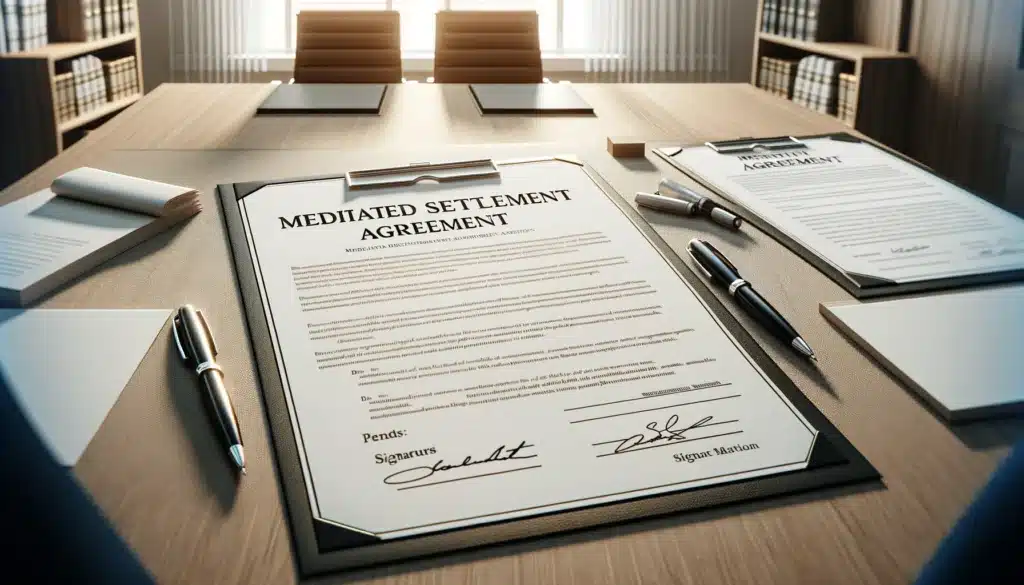For most Texans in divorce or child custody cases, a mediated settlement agreement is the key to resolution. By negotiating outside court, it saves time, money, and empowers families.
Judges appreciate avoiding trials, making settlements favorable. However, when children are involved, judges ensure agreements prioritize their best interests.

In re Stephanie Lee
Most settlement agreements go unchanged by judges. However, a recent incident in Houston saw judges declining to honor an agreement. It’s one they deemed not in the children’s best interest.
Ultimately, the Supreme Court of Texas was called on to decide whether or not the agreement was valid.
For those who are interested, the name of the Supreme Court case is In re Stephanie Lee. For the sake of brevity, I will provide a thumbnail sketch of the facts of this case.
Summary of the Facts
Essentially a mother and father were involved in a post-divorce child custody case. They had agreed to a binding Mediated Settlement Agreement. Within that agreement was a visitation schedule where both mom and dad had pre-scheduled visitation with the child.
This is the norm for Texas custody cases. What stood out was the father informing the judge that he no longer agreed with his ex-wife on visitation. He stated it during a court hearing, after reaching an agreement. This was due to her recent marriage to a registered sex offender.
Both judges assigned to the case declined to approve the agreement made between the parties. The father’s revelations suggested it wasn’t in the child’s best interests to be around a registered sex offender.
Best Interest of the Child?
How does the Texas Family Code handle such a situation? In our state, the law prioritizes the best interests and safety of the child. It is above all else in any family law order issued by a court.
These objectives become somewhat difficult to enforce when mediated settlement agreements can only be overturned by a Court when family violence is involved that affected the decision making capabilities of a party to the agreement and if the agreement is not the best interests of the child.

Court’s Decision Appealed
Ms. Lee appealed the trial court’s decision but lost in a higher court, and the mediated settlement agreement remained unenforced. Seeking the Texas Supreme Court’s opinion, she discovered that trial court judges overseeing such cases cannot reject a mediated settlement agreement. This is even if they believe it’s not in the children’s best interests.
The Texas Supreme Court ruled that the agreement was indeed in the children’s best interests. If the agreement posed a danger to the children, the trial court could raise concerns through other channels.
The Texas Supreme Court’s Decision
The Texas Supreme Court had to decide what was more important:
- a judge’s ability to protect what he or she believes is the best interests of child whom their Court has jurisdiction over, or
- the widely held belief that once parties entered into a mediated settlement agreement no party and the Court itself should not be able to interfere with the agreement absent those two conditions outlined earlier in this blog post.
It is the public policy of our State that parents have the primary responsibility to make decisions in the best interest of their children. When parents come to an agreement outside of Court it is assumed that they have done so.
The mediator’s involvement and endorsement of the agreement reinforced the notion that the parents’ preferences would prevail over a judge’s disagreement regarding the child’s best interests.
In essence, for the parties involved in this case, their mediated settlement agreement was deemed valid. Consequently, the Trial Court was directed to adhere to the decision of the parties and endorse the Order drafted based on that settlement agreement.
Mediated Settlement Agreements are Hard to Overturn
For parties to child custody and divorce cases in Texas, this ruling by our Supreme Court further strengthened the validity of mediated settlement agreements no matter what was actually agreed to.
As a result of this decision, Trial Courts hesitate to challenge settlement agreements, offering most parties the assurance that a judge cannot unexpectedly change the course of a case. While this may not always be advantageous, it generally offers peace of mind.

Our State allows multiple means by which parties can resolve issues outside the courtroom, and when agreements are reached it is important for those settlements to be honored.
When it comes to contested issues in family law cases, the Houston divorce attorneys with the Law Office of Bryan Fagan, PLLC are prepared to assist you and your family.
If you have questions on any family law issue, please do not hesitate to contact our office today schedule a consultation with one of our attorneys- free of charge.
Ebook
![Adobe Stock 62844981[2]](https://www.bryanfagan.com/wp-content/uploads/2023/09/AdobeStock_628449812.jpeg) If you want to know more about what you can do, CLICK the button below to get your FREE E-book: “16 Steps to Help You Plan & Prepare for Your Texas Divorce”
If you want to know more about what you can do, CLICK the button below to get your FREE E-book: “16 Steps to Help You Plan & Prepare for Your Texas Divorce”
![Divorce Wasting Assets[4]](https://www.bryanfagan.com/wp-content/uploads/2023/09/Divorce-wasting-assets4.jpeg) If you want to know more about how to prepare, CLICK the button below to get your FREE E-book: “13 Dirty Tricks to Watch Out For in Your Texas Divorce, and How to Counter Them” Today!”
If you want to know more about how to prepare, CLICK the button below to get your FREE E-book: “13 Dirty Tricks to Watch Out For in Your Texas Divorce, and How to Counter Them” Today!”
Other Articles you may be interested in:
- 5 Things to Do to Prepare your Texas Divorce Case for Mediation
- 3 Great Texas Divorce Mediation Ideas
- What is mediation?
- What is Divorce and Family Law Mediation in Spring and Houston Texas?
- 6 things You Need to Know Before You File for Divorce in Texas
- I Want a Texas Divorce but My Husband Doesn’t: What can I do?
- Can I sue my spouse’s mistress in Texas?
- 6 Tips – On How to prepare for a Texas Divorce
- Child Custody Basics in Texas
- 6 Mistakes that can Destroy Your Texas Divorce Case
Frequently Asked Questions
How do you enforce MSA in Texas?
Enforcing a Mediated Settlement Agreement (MSA) in Texas typically involves filing a motion to enforce with the court where the MSA was approved. The court will review the MSA and, if it meets legal requirements, issue an order to enforce it.
Is a mediated settlement agreement binding in Texas?
Yes, a mediated settlement agreement in Texas is generally binding. Once approved by the court, it becomes a legally enforceable contract.
Can you change a mediated settlement agreement in Texas?
Changing a mediated settlement agreement in Texas can be challenging. Generally, it requires the agreement of both parties or valid legal reasons, such as fraud or a significant change in circumstances.
What happens after mediation in Texas?
After successful mediation in Texas, the mediated settlement agreement is typically submitted to the court for approval. Once approved, it becomes a court order, and parties must adhere to its terms.
Can a mediated divorce settlement be overturned in Texas?
Mediated divorce settlements in Texas can be overturned in limited circumstances, such as fraud, duress, or a party’s incapacity at the time of mediation. However, such cases are rare.
Is a mediation agreement reached enforceable?
Yes, a mediation agreement reached in Texas is enforceable when it meets legal requirements and is approved by the court. It becomes a binding contract.
What is a motion to enforce a settlement in Texas?
A motion to enforce a settlement in Texas is a legal action taken to request the court’s intervention in ensuring that the terms of a settlement, such as a mediated settlement agreement, are upheld and enforced.
Is the MSA a final decree?
No, a Mediated Settlement Agreement (MSA) is not typically a final decree in itself. It is a contract outlining the agreed-upon terms. To become a final decree, it must be approved by the court and incorporated into a final judgment.
Law Office of Bryan Fagan, PLLC | Houston, Texas Divorce Lawyers
The Law Office of Bryan Fagan, PLLC routinely handles matters that affect children and families. If you have questions regarding divorce, it’s important to speak with one of our Houston, TX Divorce Lawyers right away to protect your rights.
Our divorce lawyers in Houston TX are skilled at listening to your goals during this trying process and developing a strategy to meet those goals. Contact Law Office of Bryan Fagan, PLLC by calling (281) 810-9760 or submit your contact information in our online form. The Law Office of Bryan Fagan, PLLC handles Divorce cases in Houston, Texas, Cypress, Klein, Humble, Kingwood, Tomball, The Woodlands, the FM 1960 area, or surrounding areas, including Harris County, Montgomery County, Liberty County, Chambers County, Galveston County, Brazoria County, Fort Bend County and Waller County.
Bryan Fagan, a native of Atascocita, Texas, is a dedicated family law attorney inspired by John Grisham’s “The Pelican Brief.” He is the first lawyer in his family, which includes two adopted brothers. Bryan’s commitment to family is personal and professional; he cared for his grandmother with Alzheimer’s while completing his degree and attended the South Texas College of Law at night.
Married with three children, Bryan’s personal experiences enrich his understanding of family dynamics, which is central to his legal practice. He specializes in family law, offering innovative and efficient legal services. A certified member of the College of the State Bar of Texas, Bryan is part of an elite group of legal professionals committed to ongoing education and high-level expertise.
His legal practice covers divorce, custody disputes, property disputes, adoption, paternity, and mediation. Bryan is also experienced in drafting marital property agreements. He leads a team dedicated to complex family law cases and protecting families from false CPS allegations.
Based in Houston, Bryan is active in the Houston Family Law Sector of the Houston Bar Association and various family law groups in Texas. His deep understanding of family values and his professional dedication make him a compassionate advocate for families navigating Texas family law.




